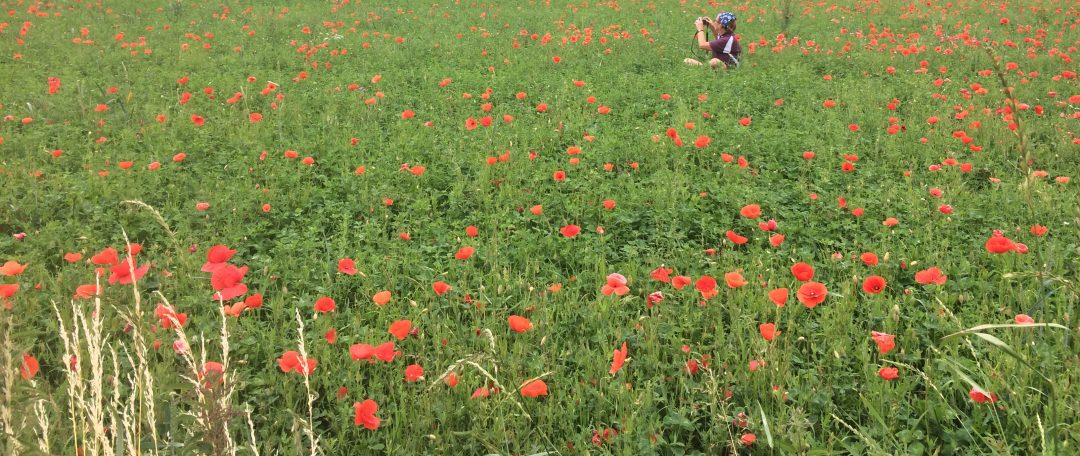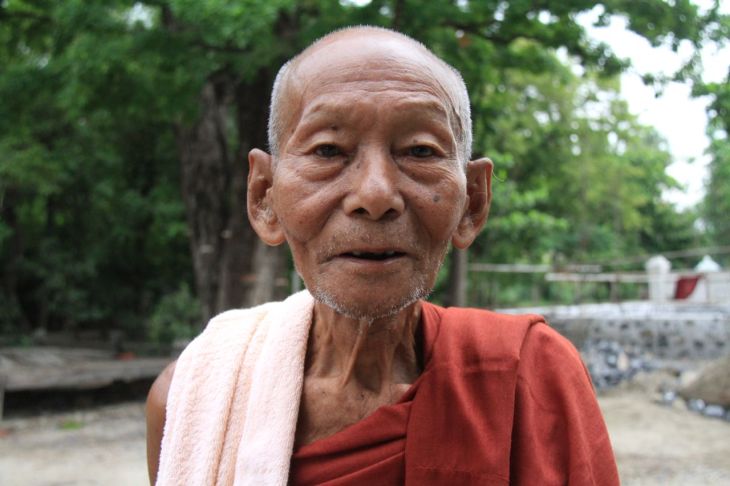I met a monk on Mandalay Hill. He is 24 and his name is Nyanathiri. He walked with me through the night, and invited me to his monastery. This morning after breakfast, I pulled the piece of paper where he’d written the name of his monastery and the cross streets out of my notebook, and left my hotel, looking for a moto taxi. They tend to just appear. I held the paper out, and my moto driver, betel-nut stained teeth clenched, and the boy who’d hailed him for me conferred. They nodded.
Carefully, he wound his way through the morning bustle of Mandalay, stopping once for a few ounces of petrol poured out of a water bottle at a roadside stall, a second time in the busy central square to insist I put the filthy helmet on. He found the cross streets, where there were several monasteries, and then tried to help me find the right one. I gave him 3000 kyat and he said he would be back for me, one hour. I said, maybe two hour. “I wait,” he said.
I held the paper out a few times as I rounded a few corners, and found a smiling young monk who said “this is my good friend, I will get him for you.”
Nyanathiri greeted me. “This is very very old monastery. Very old.”
It was made of teak, finely carved, and he showed me first the treasures – a tooth of the Buddha (the Buddha must have had centuries of teeth, judging by the relics around), a few gold icons, some paintings of the first, second and third abbots of his monastery. An old old monk moved his hands above my head and above Nyanathiri’s in a blessing. “He is 94. He is very old monk.”
He showed me where the novice monks sleep. “From 9 years old, novice. After 20, monk.”
A food bowl is on a chair, and I ask him to show me what’s in it. It’s tidier than I imagine, watching how the small offerings accumulate on the street.
“I want to treat you to coffee. Where is my bed.” He led me underneath the main building to the dormitory. His bed is near one corner, at the window, a flat platform, headboard, a folded purple and white towel in the middle. Books stacked beside his bed with a small torch. Mosquito net hangs above the bed, some blankets piled in the net.
“This is my box,” he said proudly. “This is my bed. This is where I take a meditation.” Beside the bed a wooden desk, and a shelf. “This is my bowl.”
“Did you collect food this morning?”
“You want to eat food?” He hurries to offer me the food from his bowl. “No, no,” I say. I am curious about how it feels for him to collect food every morning. I think that kind of abstract is beyond our vocabulary. He speaks English with a thickness in his throat, the awkward effort of it clear.
He shows me a bowl with various instant packets of coffee and produces an electric kettle. I don’t see outlets, but he finds one, boils water while showing me his books. He produces packaged cakes for our coffee treat, mine a jam sponge rollup I haven’t seen in decades. The coffee mix is sweet. “I like to take coffee,” he says. “I waited today to take coffee until you came.”
We look at his books, and he proudly shows me an enormous Myanmar-English dictionary. “It cost 10,000 kyats,” he says. “I save for two years.”
“You are teacher. You are my mother.” We establish that he is 24 and I am 48. Through the slats, on the other side of the wall, I hear splashing and can see buckets of water being upturned. The monks in the monastery next door are washing. Light falls thin through the slats, and it is cool at this monk’s desk.
He shows me a small illustrated history of Buddha, and tries to explain the precepts he follows to me. I pay homage to the Buddha. I take refuge in the Buddha. I take refuge in the Dhamma. I take refuge in the Sangha. He shows me the list of precepts. On I abstain from stealing, we make a joke about him stealing my iphone.
He explains that he has been a novice since he was 9, and has been a monk for 4 years, in Mandalay for 3, to go to university. He is from Chin state – there is snow there, and he must put on a dress when he goes there. He shows me a knit sweater in the same colour as his robe.
He notices the bandaid on my foot, the inflamed mosquito bites on my legs. He roots in his cupboard and produces a small pot of salve. I apply it to the bites, trying not to thing about dengue.
I show him a few pictures of snow on my iphone. “Canada is rich country,” he says. I cannot argue.
He tells me about the different forms of Buddhism in the different Asian Buddhist countries, how Myanmar Buddhism is theraveda, in which monks don’t marry. I ask him how he feels about that.
“Why do you want to know?”
“I am curious.”
“If I marry, I cannot take a meditation. I am happy when I take a meditation. A wife, I must not take a meditation.” Family takes focus away from spirituality. I ask him about how he learned to be so focused, try to illustrate my own monkey mind in meditation.
“When I begin, I think of everything – other cities, other places, people. But I concentrate my mind.” We look at each other, searchingly. Do I understand? I ask him to teach me, to be my teacher.
I sit quietly while he busies himself in his cupboard, and he finds a piece of paper with a long list of Myanmar/English vocabulary. These are the words of spirituality. He points to each of them, how meditation brings different qualities. No pain, the pleasure of concentrating his mind. One-pointedness. No delusion, no aversion, no restlessness. I think about my restlessness. He demonstrates the lotus position, how he sits in his bed, on the purple and white towel, every morning. “If you take a meditation, concentration the mind, you have no restless. I am happy when I take a meditation.” He demonstrates concentrating on his breath.
I want to know how he fits into the secular side of Myanmar life. I ask about the festivals of Myanmar, what they mean to him. “Water festival, no. People intoxicants, drunken. I sit in my bed.”
I think about Maureen, one of our university students in Kampala, sitting “lonely in her lonely room” studying hard while her friends are out at clubs. I love their seriousness.
I ask him how he feels when he is collecting food. He says women who give… and writes for me good deed. Words he finds hard to say. “It gives them an opportunity to do a good deed?” I ask. “Yes. I give illumination.”
Every step is a practice. I try to imagine stepping with such intention.
I finish my coffee and jam roll and ask him what he will do for the rest of the day. It is a university holiday. “Tonight I will go to Mandalay Hill.” Today? “I will listen English songs. You like songs?”
Magically, he produces a laptop from his cupboard, and plugs it in. The screensaver is an image of Buddha. We admire it for a moment.
He clicks on an icon, and a video of a Bulgarian or Slovakian version of American Idol springs up, and a young girl sings The Power of Love, phonetically. I am in the dormitory of a Buddhist monastery in Mandalay, with a young monk, listening to a central European girl sing Whitney Houston.
I show him that I can play music on my iphone. He doesn’t believe the sound. I play the Lumineers. We try to make out the words together. He asks me how much the phone cost. “$300” I admit. “Canada is rich country,” he says again.
“I have Canada video,” he says. “You know her?” He shows me a notebook with Aung San Suu Kyi on the cover. He clicks on a video showing her accepting an honorary degree from Carleton. I tell him I studied there, and he is delighted. We watch her for a while. A 10 year old novice monk comes up to watch over our shoulder.
I try to ask Nyanathiri about the monks in Meikhtila fighting with the muslims. My driver yesterday was fiercely anti-Muslim, and I am curious. Shared comprehension defeats us, or he isn’t interested. He is focused on his learning, and joyful at making a friend.
I find the toilet, wash my hands, making missteps everywhere. When to wear shoes, where to dump the used handwashing water. Everyone is gentle. I prepare to leave, reluctant. I want to stay at this desk in this monk’s hall, finding out what else Nyanathiri has on that laptop, listening to the sounds from next door. Find out what foods will be made with that bed filled with onions.
I tell Nyanathiri I want to give him some money to help him study. I give him $10. He folds it up small. “Buy books,” I urge him. “I will keep this to remember you,” he says. “I will see you when I look at it.”
I unpeel myself from the space, into the muted sunlight. It’s been raining all night and it is grey. I’m hot in the white shirt I’ve covered my arms with. My feet are thick and blistered, and the misguided garish pink of the toenail polish I got before I left is more ludicrous than ever. Nyanathiri signals a novice to take our photo with my iphone. We do not touch.
At the street, my moto taxi driver is waiting for me. He is now mine, I realize. I ask him his name, and it sounds like Nywinnywin. He heads off in the wrong direction. I am amused that I realize this, gently turn him around, get him to take me to the echoing, empty imperial palace that is imprisoned inside a military compound (“Tatmadaw and the people cooperate and crush all those harming the union.”
I walk around quickly, the echoing emptiness in the middle of the compound unnerving. There is little to interpret for tourists — just empty, dried out palace. Nwinnywin waits for me. I direct him to a Myanmar restaurant, eat fish curry and rice, head back to my hotel to pack to leave Mandalay.













The written language there – is it called Myanmar too? – is so beautiful, each letter like artwork. Reminds me a bit of Tagalog. Maybe related?
You absolutely know how to capture the mood and mystery of the moment.